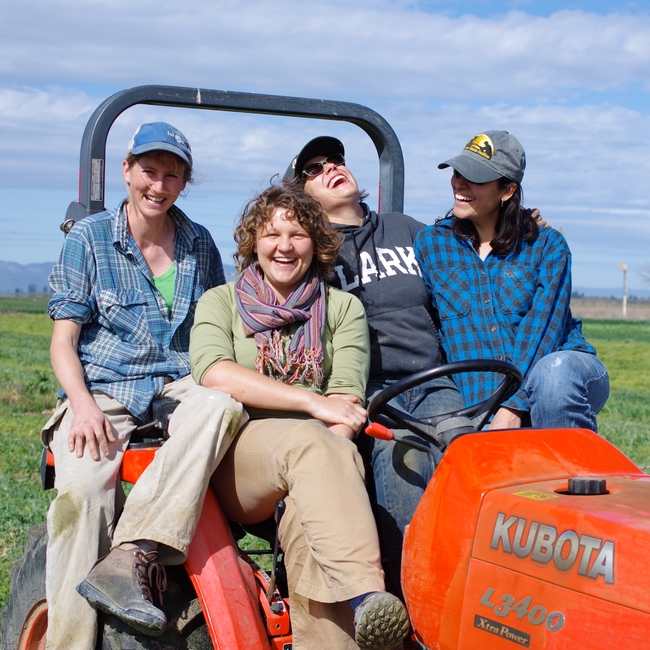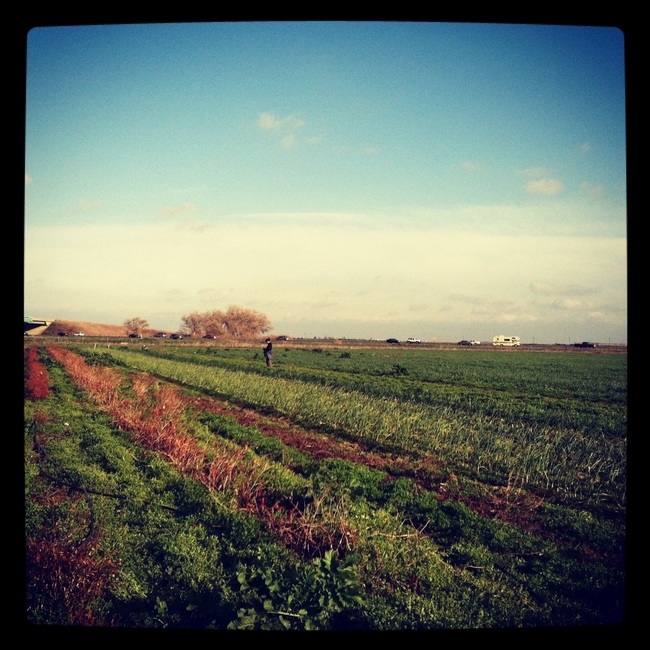Posts Tagged: beginning farmers
Cultivating connections between farmers and food buyers
The 100 miles between the agricultural fields that surround Davis, Sacramento and the Sierra Foothhills and the culinarily rich city of San Francisco can seem vast to farmers who lack the connections needed to market their produce to Bay Area buyers.
That gap was bridged last week for a group of 25 small, beginning and ethnic farmers when the Agricultural Sustainability Institute (ASI) at UC Davis and the Sacramento County UC Cooperative Extension hosted a day-long bus tour that began in Sacramento early Tuesday morning. Farmers boarded a bus bound for the Bay Area, where they met wholesale food buyers.
“Many buyers are eager to meet small-scale farmers who can supply the rapidly expanding market for locally grown food,” said David Visher of the Agricultural Sustainability Institute at UC Davis.
Emma Torbert of Cloverleaf Farm was pleased to find that to be true.
“It was nice for farmers to hear how much interest there is in San Francisco,” she said. “It can be nerve-racking to try to sell something to someone you don’t know. This was great, because the tour created an environment to talk about this sort of thing.”
Doors into the Bay Area market have already opened for Emma.
“I’ve had people calling me back already to buy my produce,” she said.
Interest in locally produced food is growing nationwide, according to Gail Feenstra of the UC Sustainable Agriculture Research and Education Program, a program within ASI. “Food is an important part of our concept of community. People want a relationship with local growers because their food nurtures us. They feed our sense of community and also steward the land in our region. I think people are searching for ways to connect around food because it benefits our personal, economic and environmental health.”
As the group headed west toward their first stop at the San Francisco Wholesale Produce Market to hear from various buyers, Visher and fellow tour organizer Chuck Ingels, a UC Cooperative Extension advisor and the interim county director for Sacramento County, shared a food safety self audit CD created by UC Cooperative Extension. The project staff also helps farmers create an action plan for marketing their produce and works with them one-on-one to write a profile about their farm.
“We can help growers tell their stories and make good-value propositions to buyers, but it’s really up to these business people to make their own deals,” Visher said.
The Agricultural Sustainability Institute, Laura Tourte, a UC Cooperative Extension advisor for Santa Cruz County, and Aziz Baameur, UCCE advisor in Santa Clara County will host a second tour Tuesday, Nov. 5. Farmers on Tuesday’s tour will leave for San Francisco from Watsonville at 5:15 a.m. and San Martin 6:15 a.m. The group will visit a wholesale distributor, food hub, distribution/processing facility, grocery store and Stanford dining services, where they will have lunch.
The Small Ethnic Farmer Tour Project is funded by CoBank, a national cooperative bank, and three farm credit associations: Farm Credit West, American AgCredit, and Farm Credit Services of Colusa-Glenn.
To register for the tour out of Watsonville and San Martin call (831) 763-8040 or email cesantacruz@ucdavis.edu. Space is limited. There is a $20 fee to hold a space on the tour. That fee is fully refunded upon boarding the tour bus. Spanish language translation is available.
Tour agenda
The promise of peaches
Tomatoes grow fine in my Sacramento backyard. I can usually count on plenty of basil, more zucchini than the neighbors will take, some snow peas, chard and kale, a few small peppers and eggplants and whatever salad greens survive the slugs (in other words, lots of arugula). We have oranges and grapefruit, but I wouldn't even try to grow peaches or apricots. It takes a farmer to grow peaches. It takes a good farmer to grow good peaches. It takes a good farmer and good weather to grow Blenheim apricots.
Instead of planting a peach tree, I joined a fruit community supported agriculture (CSA) program, promising to pay $15 a week for a box of fresh fruit every week from June 7 until October 4. By joining I am agreeing to share the risk and the promise of the harvest of a four-acre fruit orchard with four part-time beginning farmers growing fruits and vegetables just west of Davis.
Emma Torbet and Sasha Klein started growing vegetables as The Cloverleaf at Bridgeway Farms about two years ago. Rich Collins, land-owner and sponsor of The Cloverleaf, planted the fruit trees four years ago but doesn't have the time to manage the orchard, so he leased it to the Cloverleaf farmers this year. Aubrey White and Marisa Alcorta joined as farm partners also this year. Together, the four women work long hours on weekends and evenings to farm an acre and a half of vegetables and the four acres of peaches, apricots, nectarines and figs. Like most beginning farmers, all four work full-time at other jobs; Torbet at the Russell Ranch Sustainable Agriculture Facility, Klein with the Farmer Veteran Coalition, White with the UC Agricultural Sustainability Institute, and Alcorta with the National Center for Appropriate Technology.
The Cloverleaf at Bridgeway Farms offers a chance that is, Aubrey White says, "both attractive and terrifying, with everyone trying to make it happen while keeping their jobs." The monetary investments were low, as they have no buildings or heavy equipment, and Collins offered a very attractive lease arrangement to encourage the new farmers. The vegetable land is certified organic and the orchard land is in transition to organic. The part that is terrifying is the risk of crop failure and poor yields that all farmers face.
The Cloverleaf farmers all have some farming experience, but the orchard presented new challenges. White started with the UC Master Gardener Program in Los Angeles, worked with urban farms and community gardens, and for two years at the UC Davis Student Farm. But, she says, taking on the orchard involved a "crazy different learning curve for three out of four of us." Even with all of her agricultural experience, she felt at a disadvantage not having a science background, particularly not having the soil science information to best manage the orchard.
Luckily, the new farmers found a mentor. Organic farmer Carl Rosato, owner of Woodleaf Farm near Oroville, is the soil scientist peach farmer that every beginning orchard manager would love to know. Rosato has taken on advising the Cloverleaf farmers as they learn to confront peach leaf curl and blossom rot by keeping the soil healthy and pruning the trees to ensure good air ventilation. Knowing that Rosato is involved gives me hope that we'll see some Blenheim apricots in the CSA box this June.
The original point of CSA programs was for the community (eaters) to share the risk of farming with the farmers, and to pay for a season's worth of produce up front to ease the cash-flow burden on the farmer before the harvest. In a pure traditional CSA, the farmer estimates the production for the year and sells shares in that production to as many families as the farm can be expected to feed. Each family receives a box of produce every week, with the full week's harvest divided up among the boxes. Some weeks there would be more variety than others; bounty and low yield would all be shared. Some years there would be good harvests and some years, poor harvests. The farmers are not at the mercy of the market, either wholesale buyers or competitive farmers' markets.
Most California CSA operators do not follow this traditional model, but sell to wholesale customers, restaurants, farmers markets and food processors in addition to the CSA customers. This means, in practice, that CSA customers do not share the full risk of the farm production and can expect a more consistent quantity in their box or basket each week. However, CSAs are an important and valuable part of most CSA operators' marketing plan. A UC study of several California organic farms selling through different marketing channels showed that the CSAs consistently returned the most profit to the marketing investment.
As a small farm with a young orchard, The Cloverleaf's fruit CSA still involves a little risk to the members. If the rain continues through June, as it did last year, we may not get those delicious Blenheims. Last year everyone lost them. But CSA manager White promises to give first priority to the CSA customers, with 25 to 50 percent of the fruit harvest going to CSA members. If needed, Cloverleaf will buy more blackberries from Collins or fill the boxes with the more successful varieties of peaches and nectarines.
In addition to the CSA, The Cloverleaf farmers will operate a farm stand, several U-pick days and a harvest festival this year, and sell fruit to several wholesale buyers. Just in case they don't have enough to do, they are considering introducing pastured chickens to the farm next year. The farm stand will open on Memorial Day at the Kidwell Road exit off Highway 80 between Davis and Dixon, and will remain open on Saturdays and Sundays until October. Information about the U-pick days and the harvest festival (and lots of other on-farm activities throughout California) will be listed on the UC Agritourism Directory, www.calagtour.org.
There might be a few shares left for the fruit CSA. For more information, visit the website or Facebook page of The Cloverleaf at Bridgeway Farms or email thecloverleaffarm@gmail.com. I'm looking forward to those peaches!





